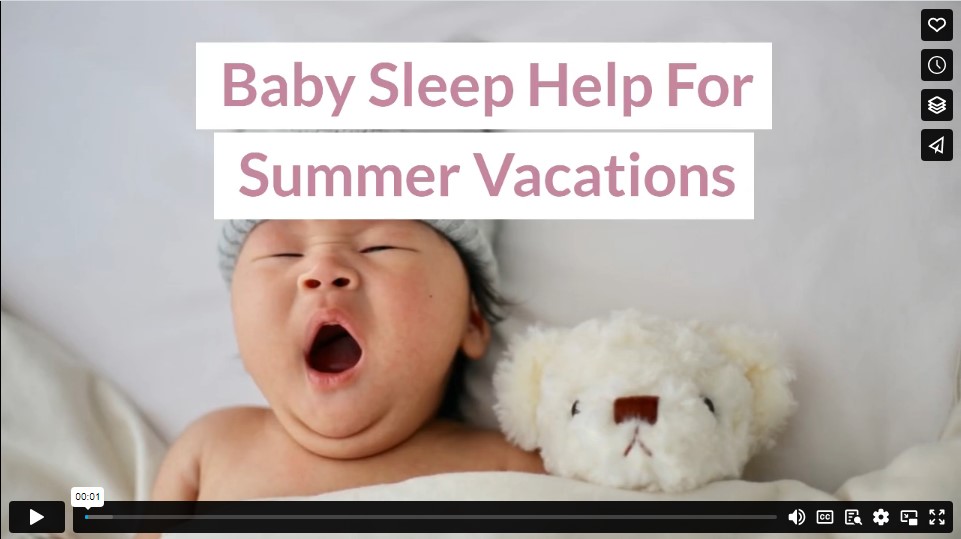Have you ever gone on vacation and struggled to return to your routine when you arrived home? You can call it jetlag, a travel hangover, or the post-vacation blues. Regardless of the label, everyone experiences this issue, even your little one. Vacations often mean disrupted sleep and schedules, especially in a different time zone. It’s normal to find your little one’s routine is a bit off and may require extra flexibility. However, once you’ve enjoyed your vacation, you don’t want to bring those sleep disruptions home. If you find yourself asking yourself if your baby will get back to their routine or sleep through the night again, then here are some tips to help you and your little one adjust:
1. Maintain Your Routine While Traveling
Sleep is always going to suffer a little bit over vacation. So starting with a good sleeper and consistent routine is always best. If you don’t have that, try establishing one before setting off on a trip, as your little one will be much more likely to go with the flow. Then, when you return, it’s much easier to reestablish your good foundation, even if you got off track a bit.
No matter how flexible or strict your typical routine is, you may have allowed some habits to slip during travel. This could be feeding your little one to sleep, staying with them until they dozed off, getting them out of their crib before dawn, all naps on the go in the stroller, and so on. Whatever they are, don’t bring them home with you. Leave them on your vacation, and get right back to whatever your usual approach is at home.
2. Recreate Their Bedroom Wherever You Are
Before you travel, think about what accommodations will look like while away. If your baby sleeps in their own room, try to maintain that while traveling. Suddenly room sharing can increase night wakings if that isn’t your typical sleep arrangement with your baby. If that’s not possible, an ensuite bathroom or spacious walk-in closet can work in a pinch if they have adequate circulation. Maintaining separate sleeping spaces is ideal, but a barrier like a changing screen, curtain, or portable sleep tent can also help everyone get a good night’s sleep.
If you have resisted a blacked-out nursery with a sound machine up until now, the benefit of this sleeping environment is that you can easily recreate it anywhere you travel for your baby. Ensure you pack essentials for their standard sleep environment and nighttime routine wherever you go. This can include pacifiers, swaddles or sleep sacks, crib sheets, a sound machine, portable blackout curtains, or a blackout sleep tent. A layer or two of black trash bags taped over windows in a pinch can help keep unwanted sunlight out.
3. Pay Attention To Wake Windows and Sleep Cues
Whether you change time zones or not, travel can influence your little one’s routine. Extra long travel days or rides in the car can wear them out and lead to short or extra naps or early bedtimes. The excitement of being around new people and new sights can lead to overstimulation, fear of missing out, and a myriad of other things that mean your little one tolerates longer than usual wake windows.
You never know how your child will tolerate all the changes, so pay attention to how they’re doing to adjust accordingly. Try to build in active, awake time even when traveling to help them get good sleep overnight. Pay attention to the length and timings of their naps, even the unplanned ones, to adjust the rest of their schedule to set up your nighttime sleep timings as best you can.
4. Harness The Power of The Sun
Use daylight to your advantage because natural light helps reset your body clock and promotes solid sleep. Light first in the morning when your baby wakes up helps remind their brain that it’s time to start the day. A morning walk will help both of you start your day off right. If that’s not possible, opening the blinds and turning on lights will go a long way, especially if you’re adjusting from a different time zone.
Special Notes About Traveling Across Time Zones
It’s always easier to keep your baby in their own time zone if possible instead of switching back and forth in short succession. This is always easier when traveling from the West to the East. A late bedtime will still be their standard time, and you can have them out during some of your evening plans.
If traveling from east to west, maintaining your original time zone’s timings can be challenging. You can add an extra catnap in the late afternoon to stretch them to bedtime. If it’s just an hour or two different, splitting the difference is often the best approach, pushing their sleep time later by one hour. Keep them active and out in sunlight or bright indoor lights to help them adjust to local time. Ensure you are using some sunlight-blocking aid to prevent early morning wake-ups.
Reminder: Your Infant Will Sleep Through The Night Again
Traveling doesn’t bring on sleep miracles. Your baby’s sleep quality will return to baseline if you follow the above tips. So if you started with a good sleeper that wasn’t waking overnight, remind yourself that they will return to that shortly. You both need a few consistent days and nights to get back on track.
If you happened to start your vacation with a baby who won’t sleep through the night and traveling has wrecked any semblance of sleep you were getting before, it might be time to think about an in-person or virtual sleep consultant. Read more about the indicators for a sleep coach here.
Video



